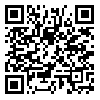Volume 14, Issue 3 (June 2016)
Nursing and Midwifery Journal 2016, 14(3): 224-232 |
Back to browse issues page
Download citation:
BibTeX | RIS | EndNote | Medlars | ProCite | Reference Manager | RefWorks
Send citation to:



BibTeX | RIS | EndNote | Medlars | ProCite | Reference Manager | RefWorks
Send citation to:
safaie sarnaghi M, Hemmati Maslak Pak M, khademvatan K, Alinejhad V. THE EFFECT OF SHORT MESSAGE SERVICE ON ADHERENCE TO TREATMENT ADVICE IN THE PATIENTS WITH HYPERTENSION. Nursing and Midwifery Journal 2016; 14 (3) :224-232
URL: http://unmf.umsu.ac.ir/article-1-2385-en.html
URL: http://unmf.umsu.ac.ir/article-1-2385-en.html
1- Urmia University of Medical Science
2- Urmia University of Medical Science ,hemmatma@yahoo.com
2- Urmia University of Medical Science ,
Abstract: (7325 Views)
Received: 16 Feb, 2016 Accepted: 21 Mar, 2016
Abstract
Background & Aims: Hypertension is one of the most important risk factors for cardiovascular diseases. Education about monitoring and controlling of blood pressure can reduce the cost of treatment, and the patient frequent hospitalizations. The devastating effects of the disease on the body’s vital organs need special attention. The present research aimed to study the effect of Short Message Service (SMS) on adherence to treatment advice in the patients with hypertension referred to Seyyedal Shohada Medical and Educational Center, Urmia, Iran in 2014.
Materials & Methods: In this semi-experimental study, 82 patients with hypertension who referred to Seyyedal Shohada Medical and Educational Center, Urmia, Iran, and had the inclusion criteria were selected using convenience sampling method. Then, they were randomly assigned to two groups of training via SMS, and control. Data collection tool included demographic questionnaire and Hill-Ben's treatment adherence questionnaire which was filled out in two steps before and after the intervention. Data analysis was performed in SPSS 16 using descriptive and inferential tests.
Result: The results of this study showed that the mean scores of adherence were not statistically different between the intervention and control groups (p=0.112). But Mann-Whitney test indicated a significant difference between the two groups in adherence after intervention (p=0.000).
Discussion: Findings obtained from the present research demonstrated that training and remote follow-up via SMS lead to adherence promotion of patients to treatment advice. Therefore, healthcare teams and nurses of these patients are recommended to apply such training methods
Send email to the article author
| Rights and permissions | |
 |
This work is licensed under a Creative Commons Attribution-NonCommercial 4.0 International License. |





 gmail.com, unmf
gmail.com, unmf